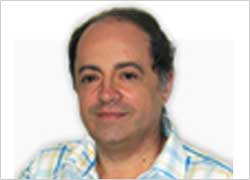Telefonica I+D Auditorio, Calle Emilio Vargas 6, 28043 Madrid
Abstract:
Mobility is, without doubt, one of the major new paradigms of the current Internet, and this is driving most of the research activity in networking throughout the World. We are gradually evolving from a network where most end-systems have a fixed or quasi-fixed point of attachment, towards a global network where end systems seamlessly move from network to network and where networks themselves change their connection point to the Internet. In spite of this there is still a long way to go before user and network mobility – at IP level – become a reality, as several technological and research challenges persist.
The current talk addresses the above challenges at various levels. After briefly providing some background on user and network mobility, an overview of the state-of-the-art is presented. Next, mobility research challenges and approaches are addressed under various perspectives, in connection with several key problem areas, namely quality of service routing in mobile ad-hoc networks, use of mobile IPv6 and soft hand-off in wireless sensor networks, interaction between multi-homing and mobility and, last but not least, route optimisation for network mobility.
Who is Dr. Fernando Boavida?
 Fernando Boavida received his PhD in Informatics Engineering in 1990, and he currently is Full Professor at the Department of Informatics Engineering (DEI) of the Faculty of Sciences and Technology of the University of Coimbra. He is the founder of the Laboratory of Communications and Telematics (LCT) of DEI and the Strategic Director for Communications and Information Technology of the University of Coimbra.
Fernando Boavida received his PhD in Informatics Engineering in 1990, and he currently is Full Professor at the Department of Informatics Engineering (DEI) of the Faculty of Sciences and Technology of the University of Coimbra. He is the founder of the Laboratory of Communications and Telematics (LCT) of DEI and the Strategic Director for Communications and Information Technology of the University of Coimbra.
His main research interests are mobility and nomadicity, content networks, quality of service, and wireless sensor networks. His publications include seven books, five book chapters, 35 papers in national conferences and journals, and 110 papers in international refereed journals and conference proceedings. He was the chairman of the Program Committee of QofIS’2001, IDMS-PROMS’2002, NETWORKING 2006, WWIC 2007 and FMN 2008 international conferences/workshops. He has been involved in numerous program committees of major international conferences, including INFOCOM 2006 and 2007. He participated in European initiatives/projects such as RARE (Réseaux IP Européenes), EWOS (European Workshop for Open Systems), COST263 (Quality of Future Internet Services), E-NET (Emerging Networking Technologies, IST-2001-37814), E-NEXT (FP6 Network of Excellence on Emerging Networking Experiments and Technologies) EuQoS (End-to-end Quality of Service support over heterogeneous networks, IST-FP6-2004-004503), WEIRD (WiMAX Extension to Isolated Research Data networks, IST FP6 Integrated Project 034622), OpenNet (Open Interconnect for the Internet Community, IST-FP6 Specific Support Action 035185) and CONTENT (Content Networks and Services for Home Users, IST-FP6-0384239).
He is a licensed Professional Engineer. He is a member of the Editorial Advisory Board of the Computer Communications journal. His homepage is at http://staff.uc.pt/boavida.
Download abstract and short CV  (67 KB)
(67 KB)
The conference will be conducted in English

